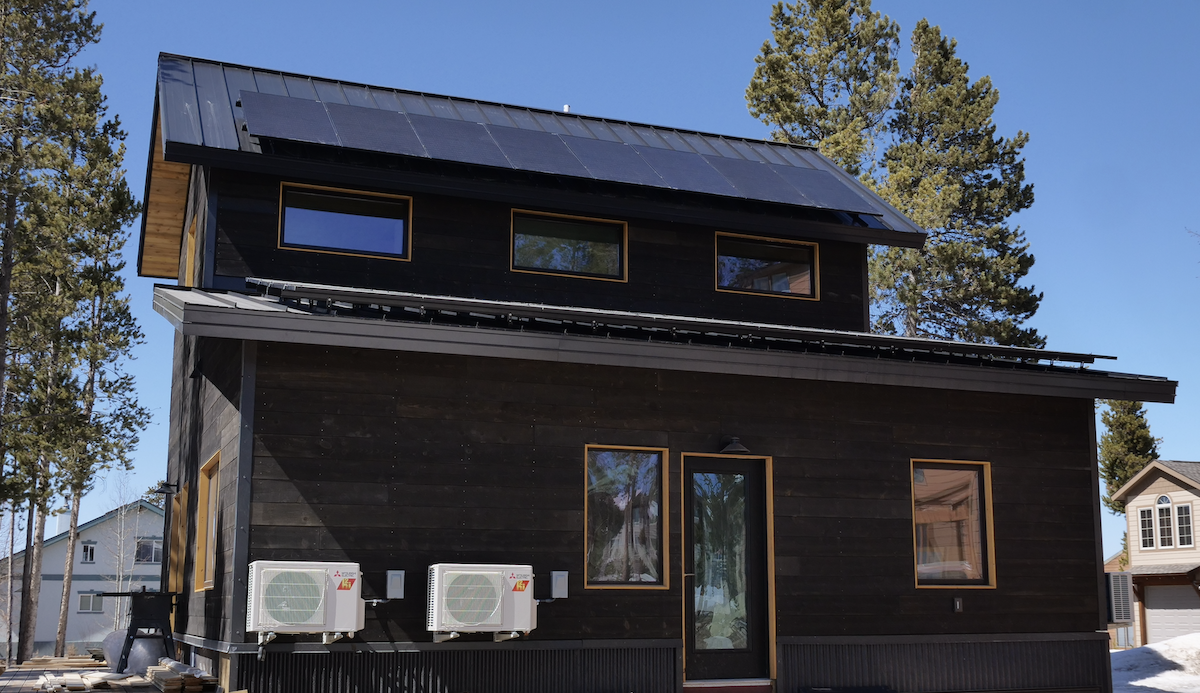Over the years, the University of Colorado Boulder (CU Boulder) has made a name for themselves in the biennial U.S. Department of Energy Solar Decathlon Build Challenge including two first-place finishes in their first two competitions. After a multi-year hiatus, CU Boulder returned to the competition this year determined to once again bring home the win—and they did just that. The team’s modular home, built and operated on the pillars of Sustainability, Performance, Attainability, Resilience and Community; the SPARC House, was recently announced the overall winner of the 2020 Solar Decathlon Build Challenge!
The Build Challenge tasks collegiate teams across the globe to build livable, affordable, solar-powered homes that respond to real-world issues. The CU Boulder team chose to address the housing attainability crisis and construction challenges often faced by mountain towns—a topical choice given the team’s building location in Fraser, Colorado, 1,200-person town in the foothills of the Rocky Mountains. The team aimed to showcase the attainability and benefits of high-performance home design by employing modular construction methods, renewable energy generation and durable building materials.
Reaching Net Zero
The SPARC House opted for a mix of electric and solar power. For their mechanical systems, CU Boulder selected Mitsubishi Electric ductless mini-split heat pump systems along with a Mitsubishi Electric PAC-US44CN-1 thermostat interface and emergency heat connections. A RenewAire Energy Recovery Ventilator (ERV) rounded out the mix to give the SPARC House exceptional performance and personalized comfort year-round.
The heat pumps used to condition the home include two 6,000 BTU/H and one 9,000 BTU/H wall-mounted indoor units, giving the future homeowners the flexibility to individually control airflow and temperature setpoint in three unique comfort zones. These units offer the highest seasonal energy efficiency ratios (SEER) and best minimum capacities for this low-load home during moderate weather. The heat pump systems also feature Hyper-Heating INVERTER® (H2i®) technology, allowing them to deliver 100 percent of rated heating capacity even when it dips to 5° F outside.
Additional high-performing building materials and systems were used to supplement the mechanical system and further improve the home’s energy usage, including a 6.5 kW photovoltaic array and super-insulating glass. These thoughtfully selected materials mean that upon its completion in April 2021, the SPARC House was not only move-in ready but achieved net-zero-energy status.
High-Performance Building as a Solution
Mountain towns face unique construction hurdles but making resilient and high-quality construction commonplace in these areas could be a key to overcoming them.
Not only do builders typically work within shortened building seasons due to high altitudes, long winters and unpredictable climates, the seasonal nature of mountain living also puts supply and demand on an ever-teetering seesaw. Mountain towns, especially ski-resort towns, tend to be further off the beaten path than some other rural communities.
Fraser, for example, sits only about 30 miles due west of Boulder, but getting there by car takes a winding, two-hour drive along mountain roads. Its location makes access to building materials, as well as builders themselves less reliable and more costly. The same can be said for calling upon contractors and maintenance technicians if there’s a problem.
Using modular construction methods alleviates much of that concern. Modular homes are built in “modules” at an offsite location, ensuring all systems are in place before final assembly onsite. This essentially eliminates the obstacle of getting materials and team members to a remote job site. Modular construction also mitigates the chance of weather-related interruptions and scheduling delays.
Join us in congratulating the 2020 CU Boulder Solar Decathlon team on their impressive efforts. This year’s competition drew 72 teams from 12 countries, all of whom shared a common goal of using and showcasing the benefits and potential of renewable energy. We’re proud to have been involved!
Read the full case study at: https://mehvac-blog.com/solar-decathlon-sparc-house











